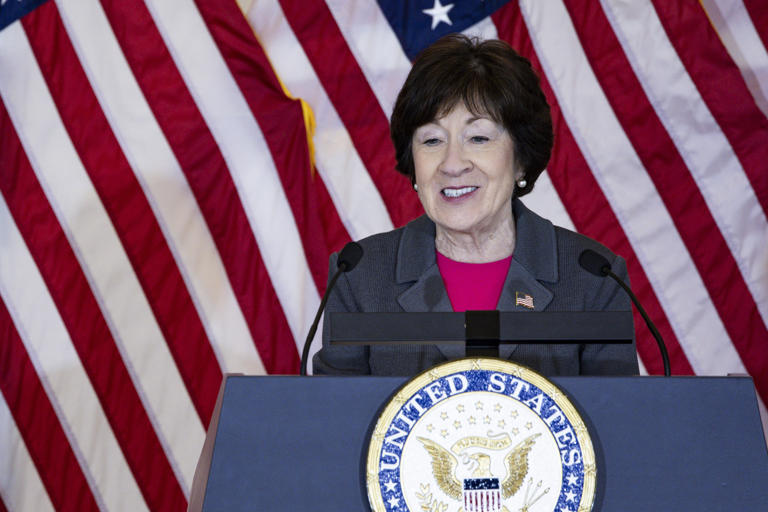Will Susan Collins Seek Re-election In 2026? The Democratic Challenge

Table of Contents
Senator Collins' Political Landscape in Maine
Collins' Recent Voting Record and Public Approval
Senator Collins' voting record presents a complex picture. While she's often sided with Democrats on key issues, earning her bipartisan praise, she has also voted with Republicans on crucial legislation. This moderate approach has shaped her public image in Maine. Analyzing her approval ratings is crucial to understanding her current standing. Recent polling data (sources needed here, e.g., Maine Public Broadcasting, University of Maine polling data) will show her current approval and disapproval ratings among Maine voters, a key indicator for her 2026 re-election prospects.
- Key Votes: Analysis of her votes on infrastructure bills, healthcare legislation, and judicial appointments will reveal her political positioning.
- Approval Ratings: Specific data points and trends in approval ratings, segmented by party affiliation and demographics, provide critical insights.
- Public Opinion Trends: Examining shifts in public opinion concerning major issues, such as the economy and healthcare, reveals the electorate's evolving views which could impact the "Maine Senate race 2026."
The Moderate Republican Profile
Senator Collins' moderate Republicanism is a defining characteristic. Her ability to bridge the partisan divide has been both her strength and her potential weakness. While it allows her to attract independent and even some Democratic voters, it sometimes puts her at odds with the more conservative wing of her own party.
- Moderate Stances: Specific examples include her votes on gun control, environmental regulations, and abortion rights.
- Demographic Appeal: Analyzing her support base across various demographics – including rural vs. urban voters, age groups, and party affiliations – clarifies her strengths and vulnerabilities.
- Challenges: The potential for primary challenges from more conservative Republicans is a significant factor in the "Collins 2026 Senate race."
Fundraising and Campaign Organization
The financial strength and organizational efficiency of Senator Collins' campaign will be critical factors. A well-funded and organized campaign can effectively counter any challenges posed by a strong Democratic opponent.
- Fundraising Totals: Information on her campaign's fundraising totals to date, as well as the overall fundraising strategy, is essential to assess her preparedness.
- Campaign Staff: The experience and expertise of her campaign staff will heavily influence her ability to run a successful re-election campaign.
- Campaign Strategy: Details about her campaign's communication plan, targeting specific demographics, and planned outreach efforts are all critical elements for success.
The Democratic Challenge to Susan Collins
Potential Democratic Candidates
Several potential candidates could emerge from the Maine Democratic Party to challenge Senator Collins. Identifying and profiling these candidates is crucial to understanding the Democratic challenge.
- Potential Candidates: List and brief descriptions of potential candidates, including their political backgrounds, and past electoral successes or failures.
- Strengths and Weaknesses: Analysis of each potential candidate’s political strengths, weaknesses, fundraising ability, and name recognition within Maine is necessary.
- Campaign Platforms: Identifying the key policy positions of potential candidates helps gauge their appeal to Maine voters.
Key Issues in the Maine Democratic Party
Understanding the key policy priorities of Maine Democrats is vital for predicting the campaign's trajectory.
- Healthcare: The affordability and accessibility of healthcare are likely to be central issues.
- Economy: Job creation, economic inequality, and the impact of national economic policies on Maine will resonate with voters.
- Environmental Protection: Maine's environment is critical; issues such as climate change and protecting natural resources will feature heavily.
Democratic Campaign Strategy
A successful Democratic strategy will likely leverage key issues and highlight perceived weaknesses in Senator Collins' record.
- Campaign Approaches: Likely strategies include focusing on specific demographics, emphasizing policy differences, and using targeted advertising campaigns.
- Targeting Demographics: Identifying which segments of the electorate are most likely to support a Democratic challenger and tailoring messages to resonate with those voters is crucial.
- Attack Points: Potential attack points could include her voting record on certain key issues or perceived conflicts of interest.
Predicting the Outcome: Will Susan Collins Seek Re-election in 2026?
Several factors will influence Senator Collins' decision: her own political ambitions, the strength of any potential Democratic challenger, and the overall political climate in Maine and nationally. While she enjoys strong name recognition and a proven fundraising ability, her moderate stance could create internal challenges within her own party. A strong Democratic challenger could pose a significant threat, especially if the national political climate shifts unfavorably for Republicans.
The likelihood of her seeking another term depends on a complex interplay of these factors. Scenarios range from a comfortable re-election victory if the political landscape remains relatively stable to a surprisingly close race or even a defeat if the Democrats put forward a strong candidate and successfully mobilize voters.
Conclusion: The Future of Susan Collins' Political Career and the Maine Senate Race
The 2026 Maine Senate race will be a closely watched contest. Senator Collins faces both significant challenges and opportunities in a potential re-election bid. Her moderate stance, while attracting some voters, may alienate others, particularly within her own party. The strength of the Democratic challenger will be a crucial determining factor. The evolving political landscape of Maine and the nation will greatly influence the outcome. To stay informed about the Susan Collins re-election in 2026 and the developments in the Maine Senate race, follow reputable news sources covering Maine politics and the upcoming election. The next few years will be pivotal in shaping the future of Maine’s political landscape and Senator Collins' career.

Featured Posts
-
 Resi Awards 2025 Meet The Winners
May 12, 2025
Resi Awards 2025 Meet The Winners
May 12, 2025 -
 Selena Gomez And Benny Blanco Accidental Intimate Life Reveal
May 12, 2025
Selena Gomez And Benny Blanco Accidental Intimate Life Reveal
May 12, 2025 -
 Jon M Chus Crazy Rich Asians Tv Show Coming To Max
May 12, 2025
Jon M Chus Crazy Rich Asians Tv Show Coming To Max
May 12, 2025 -
 Pritchards Sixth Man Award A Look At The Celtics Rising Star
May 12, 2025
Pritchards Sixth Man Award A Look At The Celtics Rising Star
May 12, 2025 -
 Semana Santa O Semana De Turismo El Caso De Uruguay Y Su Identidad Secular
May 12, 2025
Semana Santa O Semana De Turismo El Caso De Uruguay Y Su Identidad Secular
May 12, 2025
